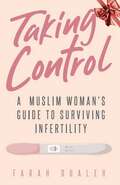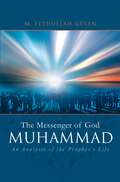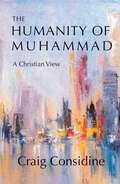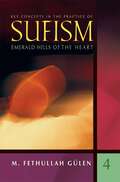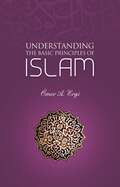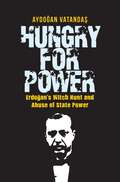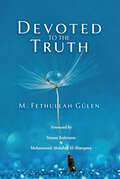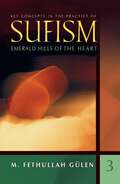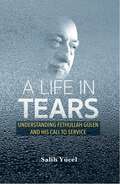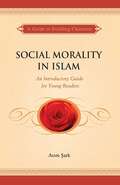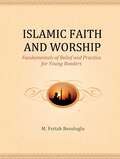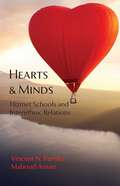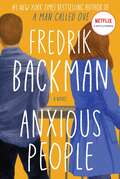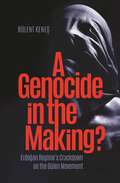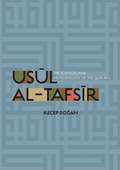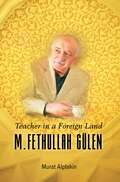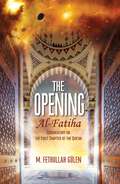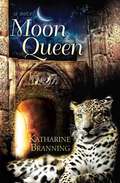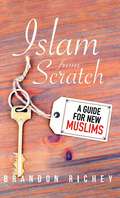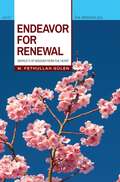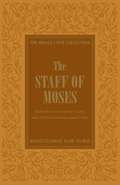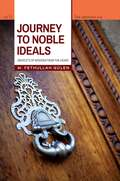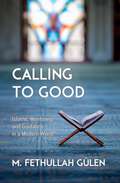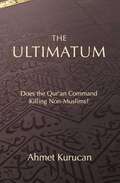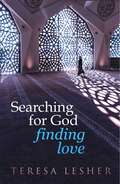- Table View
- List View
Taking Control: A Muslim Woman's Guide to Surviving Infertility
by Farah Dualeh&“Taking Control&” aims to provide a guidance for Muslim women who are trying to conceive. Author Farah Dualeh, who herself has tried to conceive for many years, shares her personal experience along with psychological tools to cope with this traumatic ordeal for women who struggle to become mothers. Dualeh also gives extensive content from Islamic perspective, including rulings on certain issues, as well as prayers.In this book, women who are trying to conceive will be encouraged to take control of their infertility experience at different levels:* within themselves * within their marriage * in relation to social pressures * on treatment options * and on what their family can look like (even when different from the 'norm')
Messenger Of God: Muhammad
by M. Fethullah GülenIn Muhammad: The Messenger of God, Gulen delves deep into the reasons how Muhammad, peace and blessings be upon him, a single man with minimum means, was able to leave indelible marks on millions of minds and souls. Rather than listing events in a chronological biography, Gulen follows an analytical framework of the Prophet&’s mission and character, providing numerous accounts from his lifetime. Gulen presents the noble Prophet in the different roles he assumed within his community as a father, husband, statesman, chief of staff, and an individual with the utmost compassion, wisdom, grace, humility, and trustworthiness.
The Humanity of Muhammad: A Christian View
by Craig ConsidineWhat makes an American Catholic of Irish and Italian descent one of the leading global voices in admiration of Prophet Muhammad? In this overview of Muhammad's life and legacy, prominent scholar Craig Considine provides a sociological analysis of Muhammad's teachings and example. Considine shows how the Prophet embraced religious pluralism, envisioned a civic nation, stood for anti-racism, advocated for seeking knowledge, initiated women's rights, and followed the Golden Rule. Considine sheds light on the side of Prophet Muhammad that is often forgotten in mainstream depictions and media narratives. The Humanity of Muhammad is Considine's contribution to the growing body of literature on one of history's most important human beings.
Emerald Hills of the Heart: Key Concepts in the Practice of Sufism
by M. Fethullah GülenConcluding a textually long but spiritually endless journey toward insan al-kamil--the perfect human--this fourth volume approaches Sufism through the middle way, an approach that revives the legacy of the Prophet Muhammad. With an awareness of the social realities of the 21st century, concepts such as tranquility, the truth of divinity, life beyond the physical realm, the preserved tablet, the glorified attributes, and the beautiful names are delicately explained.
Understanding The Basic Principles of Islam
by Omer A. ErgiThis book describes and explains the meaning of the essential articles of faith and basic forms of worship in Islam. The narration is enriched with relevant essays from prominent scholars. in addition to the answers given to the frequently asked questions, the author uses different allegories and metaphors in order to clarify his points. Perfect for young readers, the book presents the basic framework of understanding and reasoning of the Islamic faith.
Hungry for Power: Erdogan's Witch Hunt and Abuse of State Power
by Aydogan VatandasFor much of the last thirteen years, Turkey rode a wave of political, social, and economic success. When the AK Party came to power in 2002, it pursued a progressive and democratic agenda which resulted in the advancement of democratic and human rights and widespread economic growth. Two landslide election victories reaffirmed the AK Party&’s successes, and Turkey was held up to the world as an example of the peaceful co-existence between Islam and democracy. So now we ask: what went wrong?After the AK Party secured its third sweeping victory in the 2011 Parliamentary elections, Recep Tayyip Erdoğan suddenly veered off "the train to democracy" and began pursuing his personal agenda. The result has been four years of brutal crackdowns on public demonstrations, the criminalization of the free press and internet, and the deliberate polarization of society through hate speech and fear mongering. What was once a growing democracy has become a burgeoning police state. All sections of society have suffered, but few have suffered more than Hizmet, a peaceful civic movement that has been the victim of a massive witch-hunt as the government has sought scapegoats for its increasingly corrupt behavior. Such a witch-hunt should serve as a warning to the whole of Turkish society: even the peaceful are not safe.This collection of articles shed light on Erdoğan&’s transition from Muslim democrat to authoritarian leader, analyzing events as they happened. They present a variety of perspectives on Turkey&’s unique position in the Middle East, its relationship with the USA, Erdoğan&’s extreme reactions to any form of opposition, and his escalating authoritarianism and witch hunt.
Devoted to the Truth
by Fethullah GulenFor decades, Fethullah Gülen spoke on religion together with science, addressed challenging issues on faith, and inspired a generation to promote education and dialogue around the world. Those who listened to him felt empowered by this engaging and learned man of religion. To the ruling establishment of Turkey, his native country, these activities were assumed to be crossing over the line, and they made sure he suffered the consequences, especially throughout the second decade of the twenty-first century. Gülen and the people he inspired were scapegoated for the failures and malfeasance of a corrupt regime which conducted a nationwide crackdown on affiliated schools, foundations, and media organizations, while hundreds of thousands of teachers, doctors, journalists, civil servants, and supporters affiliated with them were purged and incarcerated, especially in the aftermath of the &“staged&” coup attempt in July 2016. Devoted to the Truth is a series of essays Gülen wrote following this event. What transpires from this collection is a seasoned leader who is going through all the blood, sweat, and tears to keep his ship afloat, the crew and passengers safe and calm. When the world seems to be in darkness, we find Gülen calling out to his community that this &“Eclipse&” is over, and inspires them how to be &“Travelers to the Light.&” As he leads his followers on this journey, he teaches how they should hold themselves to account by &“Facing the Self.&” While feeling &“Pity&” for the perpetrators of all the persecution they are going through, Gülen shows the path on to how to &“Heal&” and take action &“So Others May Live.&”
Emerald Hills of the Heart: Key Concepts in the Practice of Sufism
by M. Fethullah GülenDelving deeper into the soul of Islam and the definition of spirituality, this third volume examines the mainstream path that seekers are expected to follow in order to learn the fundamental concepts of Sufism and the essentials of the Islamic faith. Concepts central to Sufism, such as unity and multiplicity, silence, privacy and company, and sainthood, are thoroughly discussed.
A Life in Tears: Understanding Fethullah Gulen's Life and His Call to Service
by Salih YucelFethullah Gülen is a leading figure in the current Turkish socio-political context. Regardless of the impression different circles have about him, he is universally acknowledged as an accomplished scholar and independent thinker who has had a life in tears dreaming of a &“golden generation,&” but also a life spent in persecution and ongoing trials. This book goes beyond the current controversy around his name, and tries to explore Gülen as a scholar around his certain personal traits and some of the key concepts he has been emphasizing over the years to mobilize his audience. Based on a research that covers over seventy books, 564 sermons, over 500 talks by Gülen, more than fifty interviews of his close associates and friends aired on TV networks, and the author&’s personal observations, this book is a useful reference for those who study scholarly traditions of Islam in general and Fethullah Gülen in particular.
Social Morality in Islam: An Introductory Guide for Young Readers
by Asim SarkA believer reads to retain his liveliness. The readings will be constant and regular. For those who share the same goals, coming together and discussing books will increase the benefits. Those people who renew themselves and strengthen their faith within the written word will be firmer in their resistance against withering.Reading works that will make one closer to Allah the Almighty is praiseworthy. Even more commendable is to take one's reading beyond theory by seeking ways to bring one's knowledge into practice, for one's servanthood depends on daily improving one's performance. The essence of knowledge is practice, and its purpose is to come closer to the All-Compassionate.&“Islam is high morality&” says Prophet Muhammad, peace and blessings be upon him. The Messenger of Allah, who is a paragon of virtue, prefers people with good manners. This book, which is an introductory guide for young readers, focuses on the necessity of acquiring fine morals, the rights of parents, honesty, and etiquettes and manners in social relations.
Islamic Faith and Worship: Fundamentals of Belief and Practice for Young Readers
by M. Fettah ResulogluThe universe has been brought into existence as a peerless book speaking of its author, a masterpiece pointing to its Artist, a perfect poem indicating its Poet, and an unmatched treasure expressing the infinite wealth of its Owner. Every human being who can frame their perspective accordingly can observe the marks belonging to Allah everywhere they look, see His stamp and seal, and perceive the existence of Allah in their conscience. More precisely, the Lord of the Worlds makes Himself felt in the heart of a believer who strives to see Allah's Names everywhere they look and who exerts utmost endeavor to read in the Name of their Lord.This book is an essential guide to the basics of Islamic faith and practice for young Muslims, giving special importance to cleanliness and the Daily Prayers. With inspirational reading texts, this book can serve as a self-study manual, and is suitable as well for the curriculum of Islamic education.
Hearts and Minds: Hizmet Schools and Interethnic Relations
by Vincent N. Parrillo Maboud AnsariThis book is a comparative, qualitative research study of an educational phenomenon still functioning worldwide: Hizmet. Dr. Parrillo and Dr. Ansari present a cross-cultural study of Hizmet schools in seven countries of varying histories and ethnic compositions. Some are fairly homogeneous, while others are longstanding multicultural, multiracial societies. Some have Muslim-majority populations, others a small Muslim minority. Through hundreds of interviews with students, parents, staff, and financial supporters, the authors explored individual perceptions and experiences, as well as the triad of student/parent/school interaction. Analyzing the commonality of the schools' structures and processes in different settings, they offer their insights about the schools' success in achieving their twin goals of offering a quality education and promoting interethnic harmony.
Anxious People: A Novel
by Fredrik Backman#1 New York Times bestseller From the #1 New York Times bestselling author of A Man Called Ove and &“writer of astonishing depth&” (The Washington Times) comes a poignant comedy about a crime that never took place, a would-be bank robber who disappears into thin air, and eight extremely anxious strangers who find they have more in common than they ever imagined.Viewing an apartment normally doesn&’t turn into a life-or-death situation, but this particular open house becomes just that when a failed bank robber bursts in and takes everyone in the apartment hostage. As the pressure mounts, the eight strangers begin slowly opening up to one another and reveal long-hidden truths. First is Zara, a wealthy bank director who has been too busy to care about anyone else until tragedy changed her life. Now, she&’s obsessed with visiting open houses to see how ordinary people live—and, perhaps, to set an old wrong to right. Then there&’s Roger and Anna-Lena, an Ikea-addicted retired couple who are on a never-ending hunt for fixer-uppers to hide the fact that they don&’t know how to fix their own failing marriage. Julia and Ro are a young lesbian couple and soon-to-be parents who are nervous about their chances for a successful life together since they can&’t agree on anything. And there&’s Estelle, an eighty-year-old woman who has lived long enough to be unimpressed by a masked bank robber waving a gun in her face. And despite the story she tells them all, Estelle hasn&’t really come to the apartment to view it for her daughter, and her husband really isn&’t outside parking the car. As police surround the premises and television channels broadcast the hostage situation live, the tension mounts and even deeper secrets are slowly revealed. Before long, the robber must decide which is the more terrifying prospect: going out to face the police, or staying in the apartment with this group of impossible people. Rich with Fredrik Backman&’s &“pitch-perfect dialogue and an unparalleled understanding of human nature&” (Shelf Awareness), Anxious People&’s whimsical plot serves up unforgettable insights into the human condition and a gentle reminder to be compassionate to all the anxious people we encounter every day.
A Genocide in the Making?: Erdogan Regime's Crackdown on the Gülen Movement
by Bulent KenesThe Turkish government under the Erdoğan regime is undertaking a brutal crackdown against the participants of a civic group, namely the Gülen movement, also known as the Hizmet (service) movement, with the deliberate intention of destroying this social group, in whole or in part. In this extensive research, Dr. Keneş argues that this crackdown is filled with violations that may be classified at the very least as crimes against humanity and could very well be the harbinger of what comes next in terms of a full-scale genocide to exterminate thousands of innocent people. Keneş exemplifies many of these crimes and scales them against the genocide criteria according to definitions and norms accepted by United Nations and field experts.Given that the international community has historically downplayed the early signs of genocidal acts and thus failed to prevent such crimes many times before, it is necessary to be on the alert before the Erdoğan regime goes that far. A Genocide in the Making? is a unique volume that loudly cries out to the world this highly probable risk before it is too late.
Usul al Tafsir: The Sciences and Methodology of the Qur'an
by Recep DoganThis valuable work on the methodology of exegesis by Dr. Recep Dogan will serve as an important source of future works in the field. With his expertise in the history and exegesis of the Qur'an, as well as his familiarity and comprehensive understanding of Islamic disciplines, Dr. Dogan has managed to combine both classical and modern acquis. Presenting a variety of different approaches, Dr. Dogan also offers a broad range of Western approaches in reading the Qur'an.
Teacher in a Foreign Land
by Murat AlptekinFethullah Gülen is an enlightened person who knows well many issues related to literature, art, philosophy and science, he is a man of action who has not wasted his life, but struggled to serve humanity. He is tolerant of mankind and sensitive enough to cry when he sees an ant drown. He is a great person altruistic enough to say, "Regardless of where the fire falls, it burns my heart" instead of saying, "Fire burns where it falls." Since his childhood Fethullah Gulen has shown himself to be a unique person with his knowledge, morality and ideals. His life is full of service to others which he recommended and made in spite of the difficulties he endured for his people and all of humanity.
The Opening (Al-Fatiha): A Commentary on the First Chapter of the Quran
by M. Fethullah GulenThe principles of Islamic faith are not some abstract ideas. They are vital values to be known, reflected upon, believed and internalized, and with which one should achieve the true submission to God the Almighty. These values will be deepened with reflection and remembrance and nourished by worship in the broadest sense of the terms. If we consider them in our human relations and daily affairs, we will not be overcome by our desires and immoralities. In this way, a believer can stay in the sphere of faith all the time, revolving around its main axis. Matters of faith and its practice are reflected in the first Qur&’anic chapter al-Fatiha (the Opening) in a great harmony. In this book, Fehullah Gulen interprets the verses of the most important chapter of the Qur'an for a deeper understanding of its relevance to the essence of Islam. Gulen's analysis is well grounded in the Islamic tradition yet provides fresh insights into the message of the Qur'an for today's readers.
Moon Queen
by Katharine BranningMahperi the Moon Queen survived in a competitive court ruled by both love and hate in an era of builders and destroyers. Armed with intelligence and determination, she courageously weathered power struggles with male and female rivals, wars with the Mongols, intrigue at the court, and ultimate betrayal to become one of the most influential figures in the empire. Inspired by true events and people, Moon Queen weaves a bright carpet of inspiration, by turns inspiring and heartbreaking, providing a new perspective on one of the most glorious periods of Turkish history.
Islam from Scratch: A Guide for New Muslims
by Brandon RicheyIslam in practice can often seem opaque to the outside viewer. New Muslims and non-Muslims alike look on as believers offer salah, attend Friday prayer, wear the hijab, and fast during Ramadan, not knowing the particulars of why or how these acts of worship are performed. If you are a new Muslim, or just a curious observer wanting to know more about Islam, then this book is for you.Islam From Scratch attempts to bridge this wide gap in knowledge, helping readers understand the Islamic faith step by step, chapter by chapter. For new Muslims, this book hopes to provide you with the most critical information when taking your first steps into the faith in a way that won't overwhelm you. By the end, hopefully you will not only understand your newfound belief and the intricacies that thread it, but also appreciate the rituals and history that come with it.
Endeavor for Renewal
by M. Fethullah GulenTrue renewal is realized by retaining the purity of the seed and the root, and by synthesizing an entire inheritance of values with new thoughts and wisdom appropriate to the age. A thorough revival can only be realized with the efforts of the spirit, intellect, feelings, and willpower working in concert. Utilizing the spirit&’s power to the fullest, making flawless use of the knowledge inherited from the past, being constantly open to spiritual breezes of inspiration, not being trapped by blind imitation, and always following a sound methodology are some dynamics of an ideal renewal.The vigorous souls with steel willpower must keep running on the path of serving humanity with an insatiable love for research, an ever-evolving passion for knowledge of God, and an otherworldly profundity beyond comprehension. This book conveys the feelings and thoughts of a person who has dedicated his life for the coming of such a generation and who suffers, in heart and mind, for this noble ideal.
The Staff of Moses: Reflections of Islamic Belief, and Divine Existence and Unity
by Bediuzzaman Said NursiThe Staff of Moses is a collection of Nursi's writings concerning worship, youth, life after death, belief in the Hereafter and their relation with happiness in this world and the next.
Journey to Noble Ideals: Droplets of Wisdom from the Heart
by M. Fethullah GülenJourney to Noble Ideals is a compilation of speeches Fethullah Gulen delivered in Pennsylvania, USA, between 2012 and 2013. The book provides guidelines to build our individual ladders to self-discovery. In Gulen's prescription, climbing this ladder requires "lifelong contendedness," "a spirit of chivalry," "becoming soil to grow roses," "balance and moderation," "being self-critical," "not to be dizzy with worldly pleasures," and "sincerity of intention." Nourished from a millennium old accumulation of knowledge and tradition, Gulen speaks of preserving one's "chastity of thoughts" but not lagging behind, and instead soaring across the "horizons of spiritual knowledge." For Gulen, a healthy society is built on a "happy marriage," observing the "rights of neighbors," "sound reason," and "asking for forgiveness." Above all, his faith rests on a firm belief that "God is sufficient" for all.This work will be a source of inspiration for all the travelers' journeying to noble ideals.
Calling to Good: Islamic Mentoring and Guidance in a Modern World
by Fethullah Gulen&“Call to good and prevent wrong&”— amr bil ma'ruf wa nahy an al munkar. Depending on the translations within the Qur'anic contexts, &“calling to good&” may be rendered as promoting the right, just, honorable, righteous behavior, and virtue; whereas &“preventing wrong&” is forbidding what is evil, dishonorable, and vice. The Qur'an urges believers to embrace this duty individually and collectively and praises them when they practice this obligation (Al &‘Imran 3:104, 110). This duty is meant to encourage righteous behavior and discourage immorality and aims to remove oppression from society and instead establish justice. It should, ideally, be the distinguishing trait of a Muslim community as it applies to the moral, social, political, and economic facets of life. &“Calling to good and preventing wrong&” can be classified as a duty in the framework of teaching others about faith (tabligh). Literally meaning &“to reach out&” or &“to convey,&” tabligh is directed to raise the consciousness among people about their responsibility towards religion. It disseminates knowledge about living one's faith in a principled way. Therefore, any discourse, or any act, that conveys, communicates, reminds, promotes, or publishes the teachings and commands of God to the unknowing—or to the less informed—or any discourse or act, that discourages or prevents people from being wrong, unjust, or evil, comes under the meaning of this word, tabligh.Rooted deeply in the Qur'an, hadith, and commentaries of notable scholars, the book in your hands is a precious resource to comprehend the context and dynamics that make spiritual mentoring and guidance an important part of a faithful life. The content of the book consists of transcripts of a series of sermons M. Fethullah Gülen delivered early in his career as a preacher. While presenting extensive commentary based on examples from the time of Prophet Muhammad, peace be upon him, and Rightly Guided Caliphs, Gülen does so with awareness of the realities of the modern era, especially with regards to being free from political interests and keeping the scope as wide as possible so to embrace the whole of humanity. The book supports the idea that spiritual mentoring and guidance is an important duty and highlights some principles mentors should take into consideration. While being an essential reference for mentors and counselors in the Muslim community, the book offers many universal principles that all faith communities can benefit from and refer to in their services.
The Ultimatum: Does the Qur'an Command Killing Non-Muslims?
by Ahmet KurucanCertain verses in the Qur'an and traditions of Prophet Muhammad, peace be upon him, are abused by extremists to legitimize their acts of terrorism and violence. On April 21, 2018, the French daily Le Parisien published a manifesto demanding that &“the verses of the Qur'an calling for murder and punishment of Jews, Christians, and nonbelievers be struck to obsolescence by religious authorities,&” so that &“no believer can refer to a sacred text to commit a crime.&” The manifesto was signed by some prominent figures, including former President Nicolas Sarkozy.The manifesto is an indication of how much the Qur'an is misunderstood and the grave need for the clarification in the meaning of the scripture, especially in matters that relate to violence. In the light of the context of revelation and the universal purposes of Islamic message, this book aims to explain certain verses (Al-Baqarah 2:190-195, At-Tawbah 9:1-24, An-Nisa 4:88-89) and a particular hadith of Prophet Muhammad, peace be upon him, which are intensely debated and abused.
Searching for God, Finding Love
by Teresa Lesher&“Searching for God not only offers an inspiring, emotional insight to the author's journey to and through Islam, it beautifully maps out Islamic principles in an understandable and relatable way. Truly a five-star read!&”- Ameena Blake, Muslim scholar, UK&“A story of a Christian who always carried Islam – unknowingly – in her heart until she finally discovered it, then artistically crafted her experience with a feather. Rarely does a book touch my heart and inspire me like that.&”- Fadel SolimanBridges' Translation of the Ten Qira'at of the Noble Quran &“One of my earliest memories is of contemplating God. I was a freckle-faced girl of five, sitting quietly in catechism class when the teacher casually said, &‘God is bigger than everything.' The words hit me like a blast force. The classroom disappeared, the teacher's voice muted, and I gasped at the revelation. Bigger than the tallest tree in the yard? Bigger than a mountain? Bigger than the world? The enormity of God impressed me, but I couldn't help wondering, &‘If He is bigger than anything, where is He?'&”In this inspirational memoir, Teresa Lesher shares her search for God. She explores factors that have made her who she is as well as influencers who shape who she aspires to be and who lead her in her quest for the Divine. She dissects basic concepts that have been essential for her understanding of God as well as paradigms that shape her experience of Him. She shares her journey along the Divine Path and closer to Divine Presence through expressions of submission to Him. This quest for God takes her to her innermost self and ends with a discovery of life, an understanding of love, and a commitment to truth.
